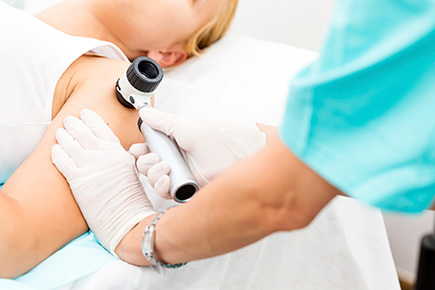300,000 Belgians Suffer from Psoriasis
Bothered by psoriasis? You're not the only one. Some 300,000 people in Belgium have psoriasis. Worldwide that's 125 million people and 2 to 3 % of the Western population1. Psoriasis is a chronic inflammation of the skin in which the affected skin cells replicate faster than those in healthy skin. The result is thick, red and often scaly patches. Psoriasis is not contagious, but there is no cure for it either. The symptoms, however, can be treated.
The diagnosis is made by your general practitioner or by a dermatologist, usually by examining the skin and asking a few questions. Sometimes, under local anesthetic, the doctor will take a small sample of the skin (a biopsy) for closer examination. The most prevalent form of psoriasis is psoriasis vulgaris1. Some people are bothered with psoriasis for a few weeks, others for a lifetime. Some of the symptoms are:
- Symmetrical, red spots
- Dry, silvery and shiny scaling that is more or less fixed in location
- A thin, red border around the spots
Do you want to be sure that you have psoriasis? Then contact your doctor.
Psoriasis can develop at any age, but it usually occurs in adults. In children, 50 to 95% of the cases are psoriasis guttata1. In this type of psoriasis, the child develops small psoriasis spots in a short period of time, often after a throat infection. This is often very difficult for the child, since the spots do itch. Rubbing or blowing, a fatty cream, gloves, socks or a salt bath can help.
Psoriasis goes further than the skin alone. In some cases, psoriasis can lead to nail deformities and joint problems. Certain diseases, such as diabetes, overweight and Crohn's disease (inflammatory bowel disease), have also been shown to occur more frequently in patients with psoriasis2. The cause of psoriasis is not entirely clear, but a great deal of research is being done to solve this puzzle1.
Furthermore, the disorder has such a negative impact on the quality of life of the patients that they also suffer from emotional and psychological symptoms1. The appearance of their skin hampers their social interactions. Patients are advised to get to know as much as possible about the illness so that it becomes easier to talk about it and to find the best care.
No cure exists for psoriasis, but thanks to the right information, advice and drug-based therapies, the symptoms of psoriasis can be significantly reduced. This is called symptomatic treatment. In this case, drug-based therapy refers to treatment with creams, salves or lotions. In addition, there is also light therapy and systemic treatments with tablets, injections or intravenous infusions, for example. Minor psoriasis is treated by the general practitioner and serious psoriasis by the dermatologist. You could call it customized treatment, since the best care for you is not necessarily the best for everyone. Ask your doctor regularly about new developments in the treatment of psoriasis.
[1] CBO Guideline on Psoriasis 2011, Dutch Association for Dermatology and Venereology (NVDV)
[2] http://www.jansseninformeert.be/psoriasis/artritis-psoriatica-en-meer (in Dutch)

